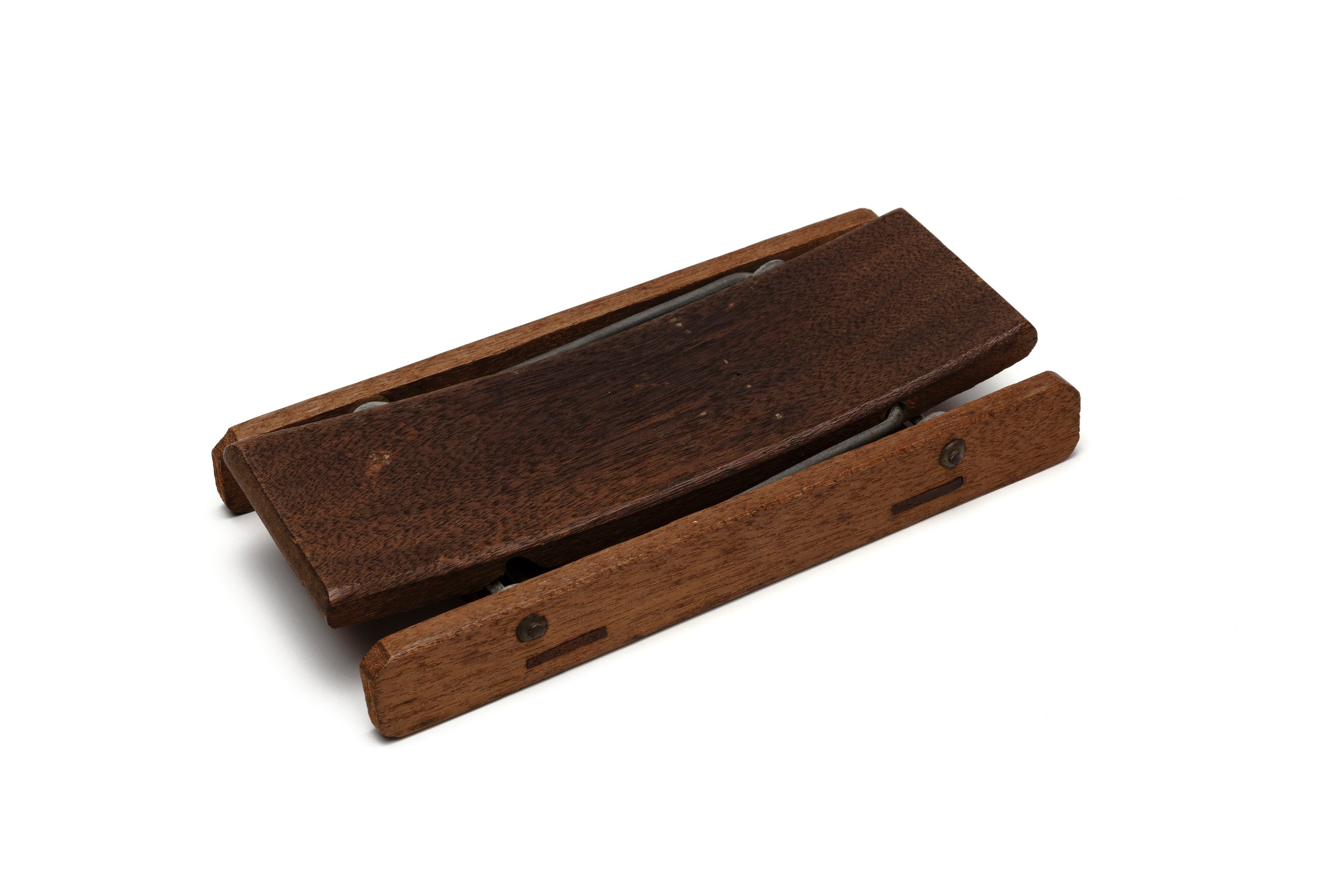Folding headrest
Object No. 2008/105/6
This folding headrest has significance in the heritage of Chinese Australians. It helps to document the commercial life of a family of fruit and vegetable wholesale merchants who made a considerable fortune after settling in Australia. After the gold rush, many Chinese Australians became market gardeners or hawkers. Mar Sun Gee, grandfather of the donor of this object, was one of the five business people who founded Wing Sang & Co in Sydney's Haymarket in 1890. The others founders included Kwok 'George' Bew and Ma Ying-piu. Like many of Sydney's Chinese community in the nineteenth century, they had come from Canton (Guangdong) province. In fact all five had come from the same Chinese village, Sha Chung, which is 45 minutes' drive north of Macau, in the Zhongshan area. Wing Sang & Co bought and sold fruit and vegetables in Sydney's markets, specialising as banana wholesalers. As a result of its founders' considerable business acumen, the company expanded rapidly and became the marketing agent for fruit and vegetables produced by Chinese growers in northern New South Wales, Queensland and the Pacific. It began importing bananas from Fiji in 1900. Wing Sang & Co became one of the most successful firms in Sydney's Chinese community. Like other successful Chinese immigrants, the proprietors of Wing Sang & Co Ltd invested in the development of new businesses in China. Ma Ying-piu was a founder of the Sincere Company, which was established in Hong Kong in 1900 using capital from the Wing Sang company. Ma Ying-piu also used profits made in Sydney to build large houses in the village of Sha Chung. Noticing that Sydney's Anthony Hordern's store had all departments under one roof, the proprietors of Wing Sang & Co believed that the department store concept would be successful in China. The Sincere Company opened department stores in Hong Kong and Canton. Its store in Shanghai was opened on Nanjing Road in 1917, and, according to family tradition, contained the first escalator in China. The store was established by the donor's 'Uncle Willie' (William Liu, a well known leader of the Chinese community in Sydney) and still stands today. Capital from Australian fruit merchant firms was used to establish other department stores in China. Staffed by Chinese Australians from New South Wales, the stores were a departure from old business practices in China. The Wing Sang company eventually established extensive trading and corporate interests in China. By the 1960s Wing Sang's wide range of enterprises included banking, hotels and manufacturing. Wing Sang & Co Ltd occupied various premises in Sydney. It was situated at Circular Quay and later owned premises at 18 Campbell St (in a building that still stands), then at 58 Hay St on the corner of Sussex St. The business was staffed by relatives of the founders, and staff lived on the premises. Mar Sun Gee handed his share of the business to his son Mar Leong Wah, the father of the donor. He worked there most of his adult life and became the manager of the business. Mar Leong Wah raised four sons, who all applied themselves to their studies. As a result, none followed him into the business, choosing instead to become a doctor, an architect, a dentist and an accountant. The donor, who became the accountant, worked for his father's firm just before the Wing Sang business moved to Flemington, prompted by the move of Sydney's produce markets to new premises there. Sydney's Chinese business community supported the Kuomintang, especially during the Japanese occupation of China and World War II. Only since the 1980s has tourism to China made it possible for them to visit the villages where their forebears lived. Peter Cox, Curator, March 2008
Loading...
Summary
Object Statement
Folding headrest, wood / metal, maker unknown, probably China, used by Wing Sang & Co Ltd, Sydney, New South Wales, Australia, 1900 - 1980
Physical Description
Headrest with wooden base, metal supports and curved surface for resting the head. The headrest folds into one plane for portability and storage. Chinese characters painted in black ink on the curved surface: "Yong Sheng Gong Si" (Yongsheng (Wing Sang, Eternal Life) Co.).
DIMENSIONS
Height
124 mm
Width
94 mm
PRODUCTION
Notes
Maker unknown. Probably made in China. Yongsheng Co. (Wing Sang Co.) was founded in 1880 in Sydney by two immgrants from Hong Kong. At the beginning, the company just operated local fruit and vegetable business. At the beginning of the 20th century, the company was very successful and has grown to involve international fruit and vegetable trading between Australia and Hong Kong. Reference: http://www.infzm.com/content/27235 http://news.southcn.com/gdnews/xhgm/sl/content/2011-09/29/content_30677707.htm
HISTORY
Notes
The headrest belonged to Wing Sang & Co and was used by its employees for taking naps at lunch time. Users would lie down and rest their heads on the curved surface.
SOURCE
Credit Line
Gift of Gordon Mar, 2008
Acquisition Date
21 May 2008

Copyright for the above image is held by the Powerhouse and may be subject to third-party copyright restrictions. Please submit an Image Licensing Enquiry for information regarding reproduction, copyright and fees. Text is released under Attribution-Non Commercial-No Derivative licence.
Image Licensing Enquiry
Object Enquiry



